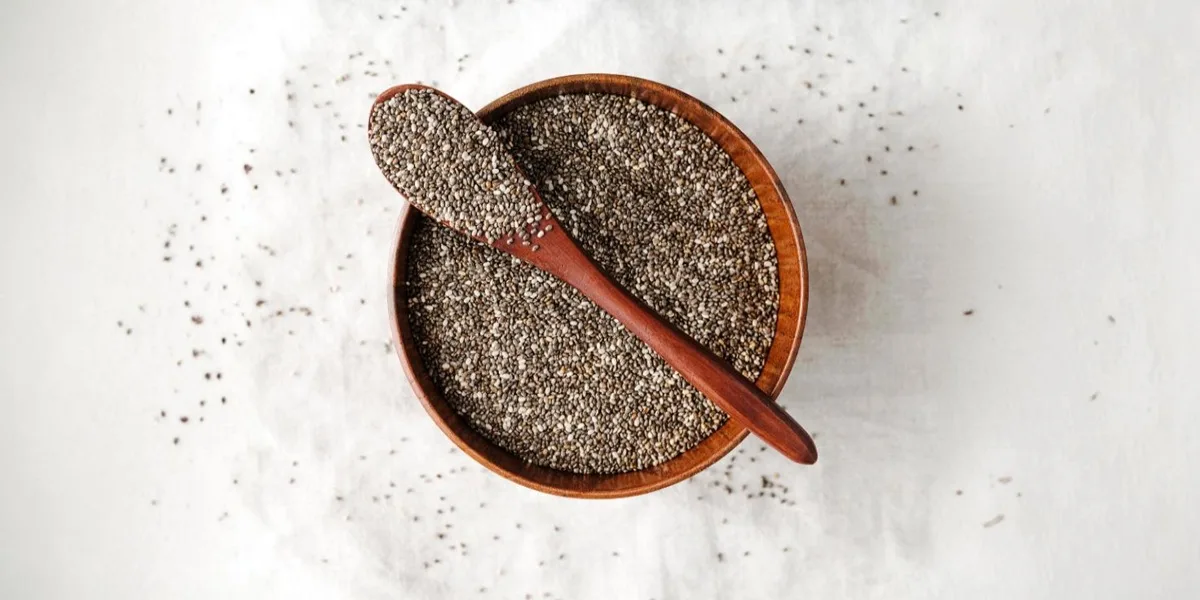14 Interesting Health Benefits of Chia Seeds

Everybody these days is talking about these tiny seeds and is calling it a superfood. It’s the chia seeds. And yes, they are indeed tiny superfoods packed with big health benefits! Whether it’s for better digestion, heart health, weight loss, or glowing skin, these little seeds have gained popularity for all the right reasons.
So, let’s understand what chia seeds can do for your health and how to use them effectively!
What are the Types of Chia Seeds?
The two most commonly available types of chia seeds are black chia seeds and white chia seeds. Both offer similar nutritional benefits and can be used in a variety of ways.
- Black Chia Seeds: The most common variety, dark in colour with tiny white or greyish spots.
- White Chia Seeds: A lighter-colored variety with an off-white appearance and a slightly milder taste.
| Break the confusion! 😇
Chia seeds and Basil seeds are NOT the same. Basil seeds are known as sabja/tukmaria/tulasi vittai/ginjalu in some Indian languages and are used in falooda, not chia seeds. |
What is the Nutritional Value of Chia Seeds?
Chia seeds are often called a superfood because they are packed with essential nutrients and are low in calories. Here’s a breakdown of their nutritional profile per 100 grams, based on the Indian Food Composition Tables (IFCT), 2017:
| Nutrient | Nutritional Value* (per 100 gm) |
| Energy | 486 kcal |
| Carbohydrate | 42 gm |
| Protein | 17 gm |
| Total Fat | 31 gm |
| Total Fiber | 34 gm |
| Water | 6 gm |
14 Potential Health Benefits of Chia Seeds
Chia seeds are a nutrient-rich superfood that may support heart health, digestion, brain function, skin and hair health, weight management, and overall well-being. Their versatility and ease of use make them an excellent addition to daily meals.
Here are some potential health benefits of chia seeds:
1. Cardiovascular Health
- May help lower cholesterol by reducing triglycerides and increasing HDL (“good” cholesterol).
- Supports healthy blood pressure levels due to its fiber, omega-3s, and essential minerals.
- Contains anti-inflammatory properties that may help protect blood vessels and improve circulation.
- May reduce the risk of heart disease by improving overall heart function.
2. Diabetes Management
- Helps regulate blood sugar levels by slowing carbohydrate digestion.
- May improve insulin sensitivity and support glucose metabolism.
- High fiber content may help prevent blood sugar spikes after meals.
3. Digestive Health
- Rich in fiber, which supports gut health, prevents constipation, and promotes regular bowel movements.
- Acts as a prebiotic, helping nourish good gut bacteria for improved digestion.
4. Weight Management
- High fiber content promotes satiety, reducing hunger and preventing overeating.
- Supports metabolism and digestion, potentially aiding in weight management.
- Provides protein, which may help maintain muscle mass and support fat loss.
5. Bone and Muscle Health
- Rich in calcium, magnesium, and phosphorus, which may support strong bones.
- Provides plant-based protein, which may aid in muscle repair and growth.
- May help prevent osteoporosis and contribute to overall bone density maintenance.
6. Brain and Nervous System Support
- Omega-3 fatty acids may enhance cognitive function, memory, and focus.
- Contains anti-inflammatory properties that may help reduce brain inflammation and support neurological health.
- B vitamins and antioxidants may contribute to a healthy nervous system.
7. Skin and Hair Health
- Antioxidants may protect skin from premature aging and oxidative stress.
- Omega-3s may help maintain skin hydration, elasticity, and reduce inflammation.
- Contains essential nutrients that may support hair strength and reduce hair fall.
8. Anti-Inflammatory & Antioxidant Benefits
- Loaded with polyphenols (caffeic acid, quercetin, chlorogenic acid) that may help fight oxidative stress.
- May help lower inflammation in the body, benefiting conditions like arthritis and autoimmune disorders.
- May protect cells from damage and slow the aging process.
9. Cancer Prevention
- Omega-3 fatty acids and polyphenols may help reduce inflammation linked to cancer growth.
- Antioxidants may help protect cells from free radical damage, lowering cancer risk.
- Some studies suggest that chia seeds may reduce the risk of breast, colorectal, liver, and pancreatic cancer.
10. Liver and Metabolic Health
- May help reduce fat accumulation in the liver, lowering the risk of fatty liver disease.
- Omega-3s and fiber may support metabolism and improve overall liver function.
11. Energy and Endurance Boost
- Provides long-lasting energy due to a balanced mix of protein, fiber, and healthy fats.
- Absorbs water and forms a gel-like texture, which may help with sustained hydration when consumed with adequate fluids.
- Known for its endurance benefits, making it popular among athletes for hydration and prolonged performance.
- Helps regulate electrolyte balance, supporting muscle function and energy levels.
12. Pregnancy Health
- Omega-3s may support fetal brain and retina development.
- High fiber content may aid digestion and help prevent constipation.
- Provides essential minerals like calcium, magnesium, and phosphorus, which may support strong bones.
- May help sustain energy levels and overall maternal health.
13. Sleep Health
- Contains tryptophan, which may help boost serotonin and melatonin for better sleep.
- Magnesium may help relax muscles and calm the nervous system.
- Fiber and protein may help maintain stable blood sugar levels, reducing nighttime wake-ups.
14. Immune System Support
- Packed with vitamins, minerals, and antioxidants that may help strengthen immunity.
- May support the body’s ability to fight infections and diseases.
How Much Chia Seeds Should You Eat a Day?
The recommended daily intake of chia seeds is about 3 teaspoons (~15 grams). This amount provides enough fiber, omega-3s, and nutrients without causing digestive issues.
If you’re new to chia seeds, start with a smaller amount and increase gradually to allow your body to adjust. Also, drink plenty of water, as chia seeds absorb liquid and expand.
But before you start adding chia seeds to your diet, hold on!
Do you really need them? Are they actually effective for you? Or are you already getting the same nutrition elsewhere? Don’t just guess – get a 1-on-1 consultation with an Expert Nutritionist and find out what’s right for your body.
How We At Fitterfly Can Help You?
Eating healthy foods like chia seeds is a great start, but real results come from the right balance of nutrition, activity, and consistency – and that’s where Fitterfly can help!
Our Nutrition Coaches guide you on how to include chia seeds and other superfoods in your daily meals, ensuring you get the right portions and nutrient balance for weight loss, diabetes control, and overall health.
Our Fitness Coaches create simple, effective movement plans that fit into your lifestyle – whether it’s at-home exercises, gentle mobility routines, or ways to stay active even with a busy schedule.
And to keep you motivated, our Success Coaches help you track progress, overcome challenges, and stay committed to your health goals – without feeling restricted or overwhelmed.
Call us at 08068507599 to know more about how we can help you better to lose weight easily.😊
Lost 12 kg in 3 months without tough diet restrictions!


Happy members
EMI
Guarantee
4.8/5
Weight Loss Program
This blog provides general information for educational and informational purposes only and shouldn't be seen as professional advice.
Frequently Asked Questions
What happens when you eat chia seeds daily?
Eating chia seeds daily may support digestion, heart health, and energy levels. They are rich in fiber, omega-3 fatty acids, and antioxidants, which may help regulate blood sugar, lower cholesterol, and promote overall well-being. Their fiber supports gut health, while omega-3s contribute to brain and heart function. To prevent discomfort, it's important to drink enough water when consuming chia seeds regularly.
What are the benefits of chia seeds for high blood pressure?
Chia seeds may help maintain healthy blood pressure due to their omega-3s, fiber, and essential minerals like magnesium and potassium. These nutrients support blood vessel relaxation, improve circulation, and help balance cholesterol levels, which may contribute to better heart health and stable blood pressure.
What are the benefits of drinking chia seeds with water in the morning?
Drinking chia seeds with water in the morning may support digestion, hydration, and appetite control. The soaked seeds absorb water and form a gel-like consistency, which helps keep you full for longer and slows digestion. This may aid in weight management, stable energy levels, and balanced blood sugar. Since chia seeds retain water, staying hydrated is key to avoid any digestive discomfort.
Are chia seeds good for skin?
Yes, chia seeds may support healthy skin! Their antioxidants help protect against premature aging, while omega-3 fatty acids may support hydration, elasticity, and a natural glow. They also have anti-inflammatory properties, which may help with acne and skin irritation. The vitamins and minerals in chia seeds further support skin repair and overall skin health.
Do chia seeds reduce belly fat?
No single food can directly burn belly fat, but chia seeds may support weight management. Their high fiber content helps with satiety, reducing hunger and preventing overeating. Omega-3s may help reduce inflammation, and their protein supports muscle health, which can help boost metabolism when combined with a balanced diet and regular exercise.
Do chia seeds help in hair growth?
Chia seeds may promote stronger, healthier hair! They are rich in protein, omega-3 fatty acids, and zinc, which nourish hair follicles, reduce hair fall, and support scalp health. Regular consumption may contribute to shinier, stronger hair, especially when paired with a nutrient-rich diet.





















